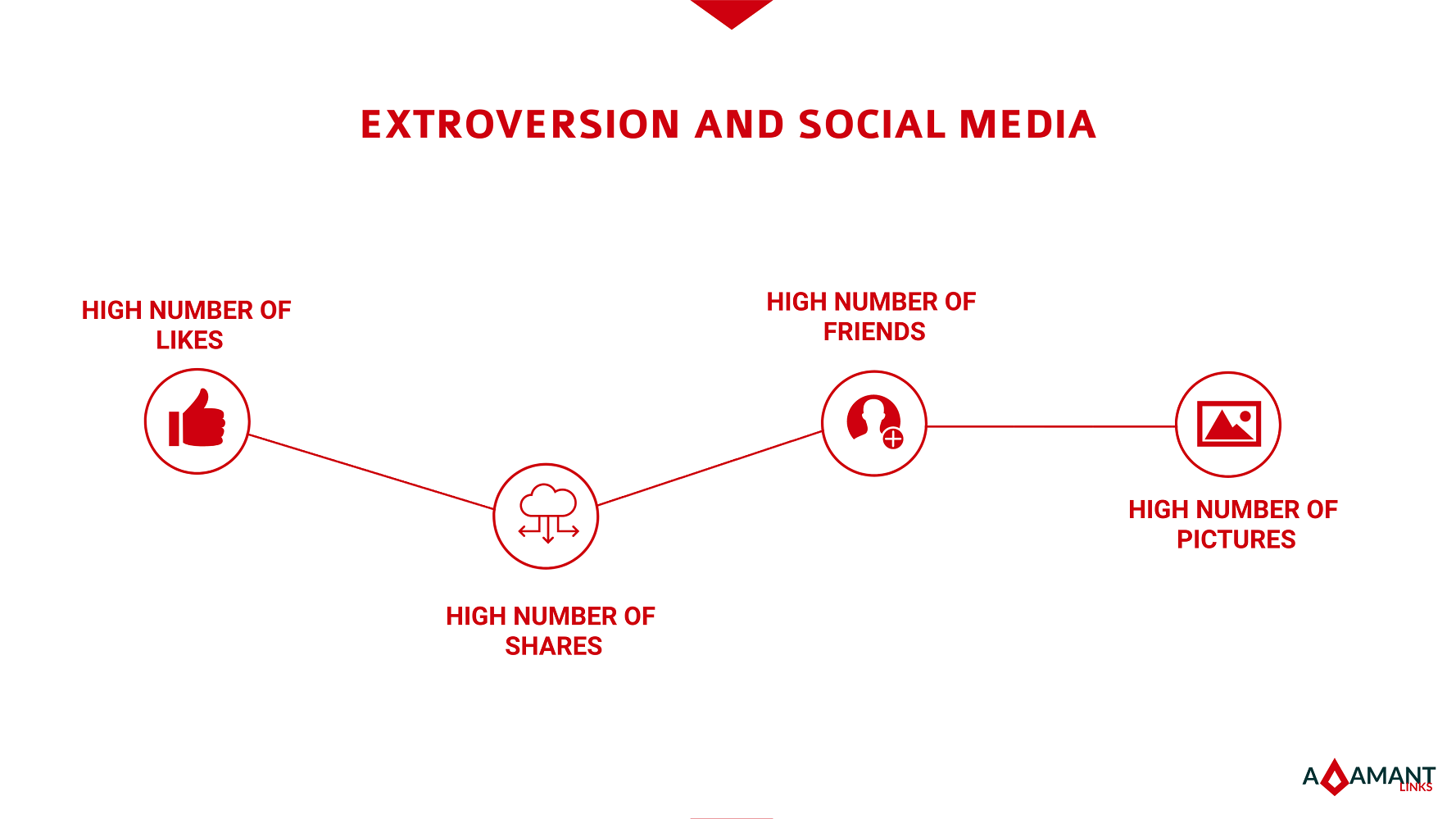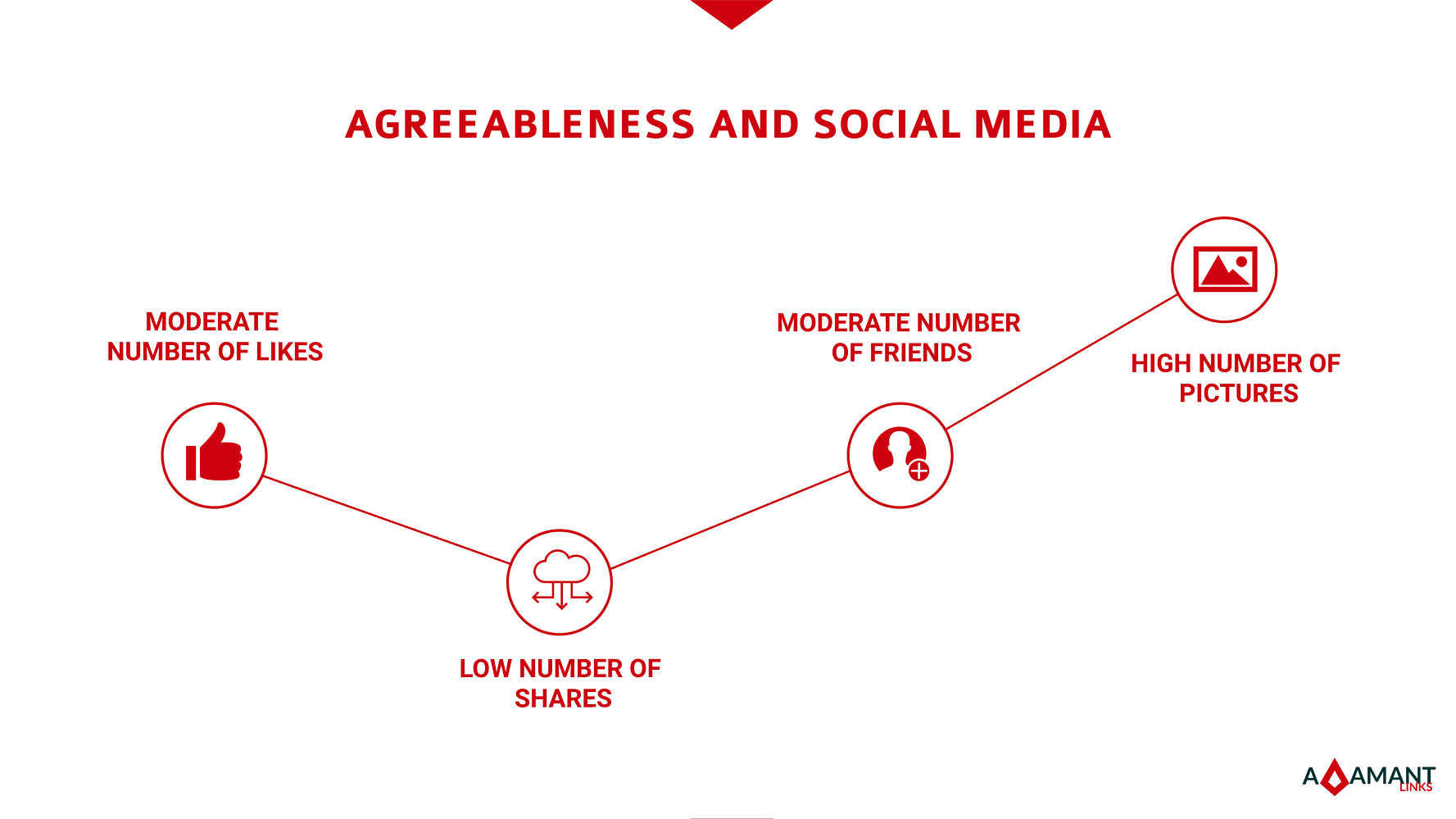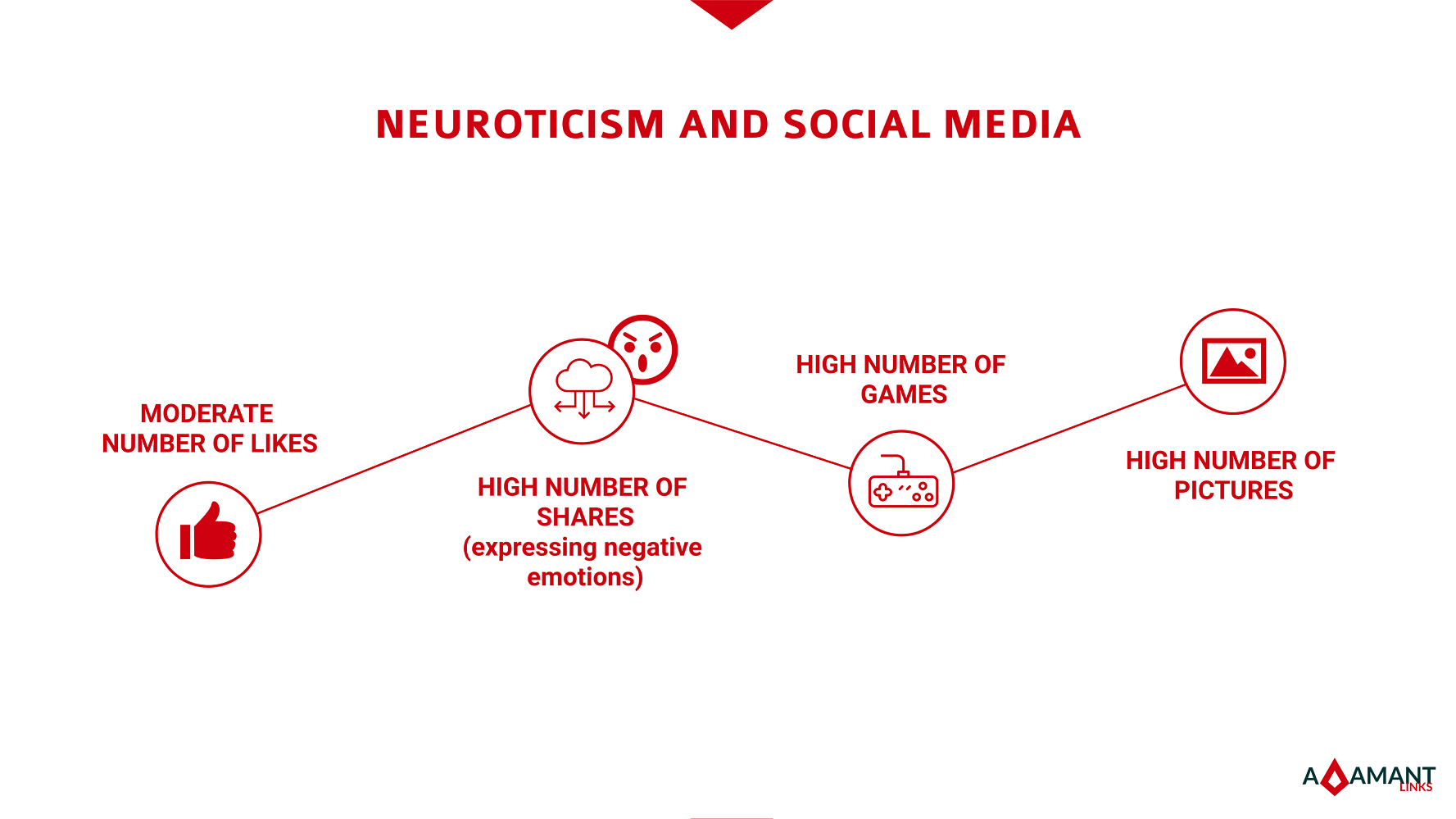by Vlad Ungureanu
Aug 2020
Key takeaways from this article!
People high in Extroversion, through their gregarious nature, tend to have high number of friends and interact with people through likes, shares, comments and posting images.
Agreeable people have larger number of posted images, especially including their families and friends, but have a very low engagement in liking and sharing, except for useful posts.
People high in Neuroticism are very carefull not to share too much personal information. They are more likely to play online/social games and are more prone to share post expressing negative emotions (even about brands and products).
Extroversion and Social Media
Extraverted people have a higher need for social affiliation/ personal communication for strategic self-presentation and as a result they have more satisfying/stable friendships than introverts. Extraverts are more likely to use social media in general. Researchers found positive relationships between extraversion and the number of contacts, the number of pictures posted the number of status updates, and the usage frequency.

Adamant Links - Extroversion and Social Media
On Facebook:
- Facebook use, number of friends, association with groups.
- High number of friends, comments, up-to-date presence.
- High number of activities.
- High number of likes, comments, shares.
- High number of sent/shared posts.
- High number of friends, pictures and albums.
On Twitter:
- High numbers of followers and people they follow.
- They usually post longer tweets.
- They are less likely to tweet links.
- More likely to retweet.
- More likely to respond to tweets.
On LinkedIn:
- They have a higher number of connections, usually going far beyond the occupational network.
- They often have multiple roles or positions, one of which is a social active and engaged role like public speaker, trainer, coach or consultant.
- They have shorter description of their responsibilities and roles, focusing more on their achievements.
Extroversion is positively correlated with the use of Facebook, Instagram and Pinterest but negatively correlated with the use of Twitter and LinkedIn. When using social media network, they tend to have much longer sessions. They prefer social media images containing people and groups of people, images portraying positive emotions and images depicting active interests. In terms of colours they prefer images with high contrast, saturation and that are chromatically complex. They are more likely to share content with others, in terms of entertainment. Some studies, also show that extroverts are more likely to share brand posts.
Agreeableness and Social Media
Agreeable people are friendly, kind and warm and have a tendency to be trusting, sympathetic, and cooperative. Individuals high on Agreeableness have more pictures on their social media profile give more information about their activities and interests view their own and other’s pages more often, have more posts from their friends on their wall and often comment on social networking sites. On the other hand, individuals high on Agreeableness use fewer page features, have fewer back-and-forth conversations and are less likely to become addicted to social media.

Adamant Links - Agreeableness and Social Media
On Facebook:
- Moderate number of friends.
- Moderate number of visited pages.
- Express positive feelings.
- High number of tags.
- Medium number of likes.
- Higher number of likes and comments for friends or family.
- High number of pictures, albums, comments.
- Higher number of words in posts.
On Twitter:
- Lower numbers of followers and people they follow.
- They usually post shorter tweets.
- Less likely to retweet.
- Less likely to respond to tweets.
On LinkedIn:
- Higher number of skills.
- Lower number of connections, focused on the job-related network.
- Most likely to have multiple entries in the "Volunteer Experience" section.
Agreeableness has no correlation (neither positive or negative) with social media use. Agreeable people prefer social media images containing friends, pets, flowers and music related elements. They are more engaged in social media network usage in the morning, with the most common activity being status updates or checking other people status updates.
When using social media networks, Agreeable people tend to be more helpful and engaged in sharing of useful news, information and video content.
Neuroticism and Social Media
People who have lower Neuroticism values are high in self-esteem and have less pessimistic attitudes than those who have higher Neuroticism values. Because they feel less isolated and experience less psychological distress, emotionally stable individuals who have lower Neuroticism values are less likely to use social media at all. The usage intensity is also found to be positively correlated with Neuroticism. Individuals with low Neuroticism values spend less time on social media, update their status less often, belong to fewer groups and are less addicted to social media usage.

Adamant Links - Neuroticism and Social Media
On Facebook:
- Avoid revelling personal information.
- Uploading many images.
- Use of swear words.
- Express negative feelings.
- Express anger.
- Like/Share posts (including blog posts) manifesting negative feelings.
- More focus on body related activities (eating, workout, exercise etc.).
- Post related to pets and animals.
- High use of Facebook games.
On Twitter:
- Lower number of hashtags.
- More likely to retweet.
- More likely to reply to a tweet.
- More likely to like and retweet posts that express anger and other negative emotions.
On LinkedIn:
- Lower number of skills, as they tent to underappreciate themselves.
- Lower number of jobs changes as they favour job security and jobs where they feel they are doing a good job.
- They describe their responsibilities and roles focusing more on their personal achievements.
Neurotic personalities are positively corelated with using Facebook, are less likely to use social network consisting of primarily image sharing and are negatively correlated with using Twitter. Multiple studies, position neurotics as the less likely personalities to engage in social network interactions. When engaging in social network use, they tend to fragment their session by alternating between multiple social networks and website navigation.
An interesting aspect of Neurotic people is that in some circumstances, for example poor health or being single for longer periods, they begin to engage heavily in exploratory searches and navigation on social media. They prefer social media images containing pets, images containing objects over images showing people; in terms of colour they prefer less chromatic diversity. While their interaction on social media is limited, they tend to blog and their blogs tend to be oriented towards expressing anger or dissatisfaction.
References:
- "Who uses Facebook? An investigation into the relationship between the Big Five, shyness, narcissism, loneliness, and Facebook usage", Tracii Ryan and Sophia Xenos, 2011
- "Personality and Patterns of Facebook Usage", Yoram Bachrach¸ Michal Kosinski, Thore Graepel, Pushmeet Kohli, David Stillwell, 2012
- "Personality Impressions Based on Facebook Profiles", Samuel D. Gosling, Sam Gaddis, Simine Vazire, 2007
- "The influence of personality on Facebook usage, wall postings, and regret", Kelly Moore and James C. McElroy, 2012
- "Need for Affiliation, Need for Popularity, Self-esteem, and the Moderating Effect of Big Five Personality Traits Affecting Individuals’ SelfDisclosure on Facebook", Jengchung Victor Chen, Andree E. Widjaja and David C. Yen, 2015
- "Recognising Personality Traits Using Facebook Status Updates", Golnoosh Farnadi, Susana Zoghbi, Marie-Francine Moens and Martine De Cock, 2013
- "Personality and motivations associated with Facebook use", Craig Ross, Emily Orr, Mia Sisic, Jaime Michelle Arseneault and Mary G. Simmering, 2015
- "Personality perception based on LinkedIn profiles", Niels van de Ven, Aniek Bogaert, Alec Serlie, Mark J. Brandt and Jaap J.A. Denissen, 2016
- "Personality Assessment Using Multiple Online Social Networks", Shally Bhardwaj, 2014
- "Our Twitter Profiles, Our Selves: Predicting Personality with Twitter", Daniele Quercia, Michal Kosinski, David Stillwell and Jon Crowcroft, 2014
- "Predicting Personality from Twitter", Jennifer Golbeck, Cristina Robles, Michon Edmondson and Karen Turner, 2011
- "Predicting Dark Triad Personality Traits from Twitter usage and a linguistic analysis of Tweets", Chris Sumner, Alison Byers, Rachel Boochever and Gregory. J. Park, 2012
- "Studying Personality through the Content of Posted and Liked Images on Twier", Sharath Chandra Guntuku, Weisi Lin, Jordan Carpenter, Wee Keong Ng, Lyle H. Ungar and Daniel Preoţiuc-Pietro, 2017
- "Predicting Personality Traits with Instagram Pictures", Bruce Ferwerda, Markus Schedl, Marko Tkalcicm, 2015
- "The Influence of Personality on Digital Photo Sharing", Daniel S. Hunt and Eric Langstedt, 2014
- "Manifestations of Personality in Online Social Networks: Self-Reported Facebook-Related Behaviors and Observable Profile Information", Samuel D. Gosling, Adam A. Augustine, Simine Vazire, Nicholas Holtzman and Sam Gaddis, 2011
- "Capturing personality from Facebook photos and photo-related activities: How much exposure do you need?", Azar Eftekhar , Chris Fullwood and Neil Morris, 2014
- "The Personality of Popular Facebook Users", Daniele Quercia, Renaud Lambiotte , David Stillwell, Michal Kosinski and Jon Crowcroft, 2012
- "Musical Preferences Predict Personality: Evidence from Active Listening and Facebook Likes", Gideon Nave, Juri Minxha, David M Greenberg, Michal Kosinski, David Stillwell, Jason Rentfrow, 2018
- „Consumer – brand engagement on Facebook: liking and commenting behaviors", Sertan Kabadayi and Katherine Price, 2014
- „Big Five Personality Traits Reflected in Job Applicants’ Social Media Postings", J. William Stoughton, Lori Foster Thompson and Adam W. Meade, 2013
- „Personality Traits and Social Media Use in 20 Countries: How Personality Relates to Frequency of Social Media Use, Social Media News Use, and Social Media Use for Social Interaction", Homero Gil de Zuniga, Trevor Diehl, Brigitte Huber and James Liu, 2017
- „How Personality Affects our Likes: Towards a Better Understanding of Actionable Images", Francesco Gelli, Xiangnan He, Tao Chen and Tat-Seng Chua, 2017
In our next article, get a detailed look at psychographics and persuasion:
Psychographics and Persuasion - Part 1
-
Market Segmentation: Overview
FEB 2020 -
Market Segmentation: Demographics
MAR 2020 -
Market Segmentation: Geographic Location
MAR 2020 -
Big Five/OCEAN Personality Model
JUN 2020 -
Psychographic Segmentation
JUL 2020 -
Psychographics and Biological Gender
JUL 2020 -
Psychographics and Age
JUL 2020 -
Psychographics and Other Demographic Segments
JUL 2020 -
Psychographics and Individual Preferences
AUG 2020 -
Psychographics and Internal Values
AUG 2020 -
Psychographics and Shopping Motivation
AUG 2020 -
Psychographics and Social Media - Part I
AUG 2020 -
Psychographics and Social Media - Part II
SEP 2020 -
Psychographics and Persuasion - Part I
MAR 2021 -
Psychographics and Persuasion - Part II
APR 2021 -
Psychographics and Persuasion - Part III
APR 2021